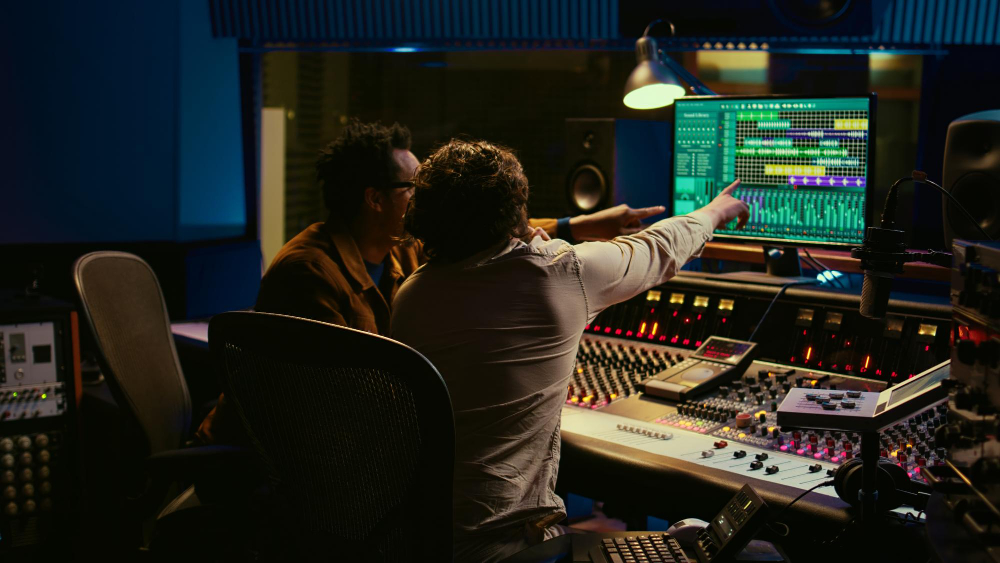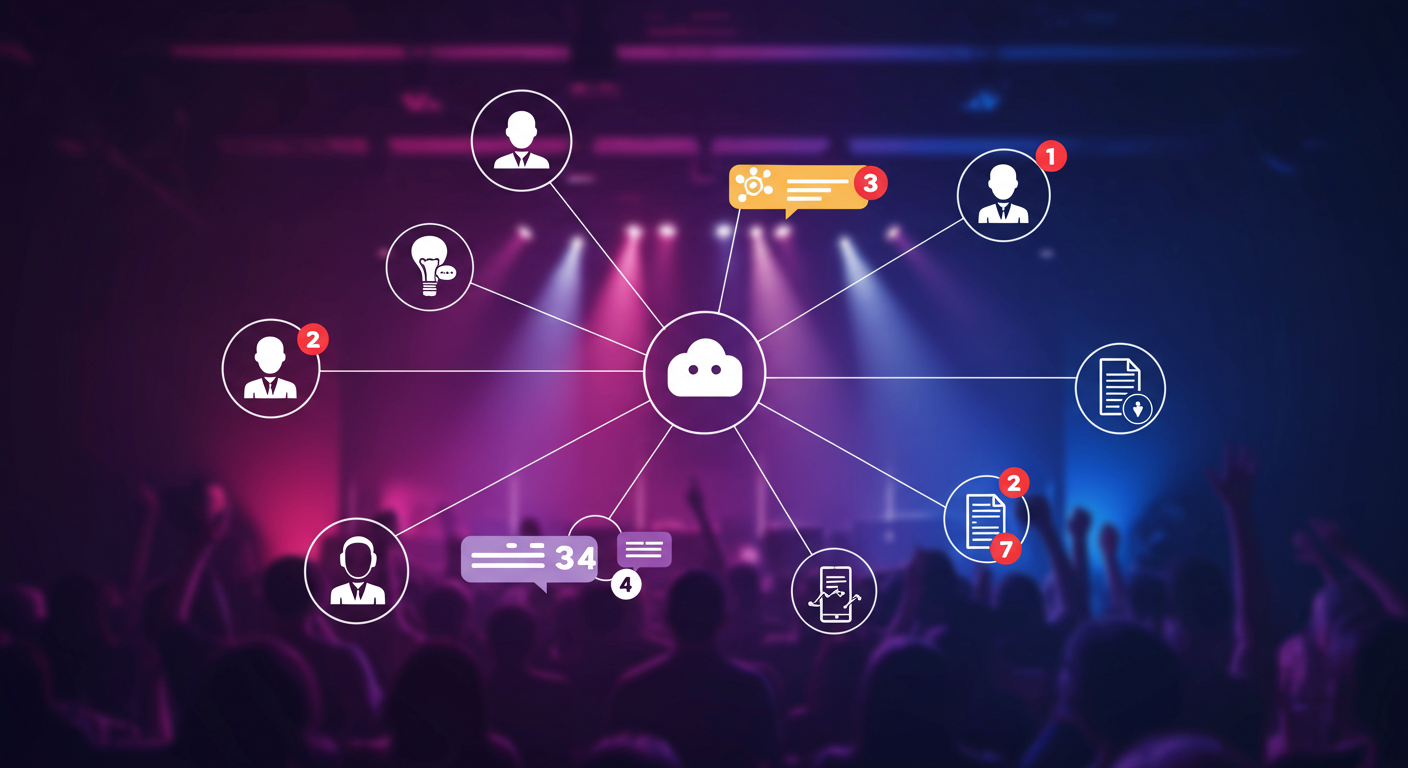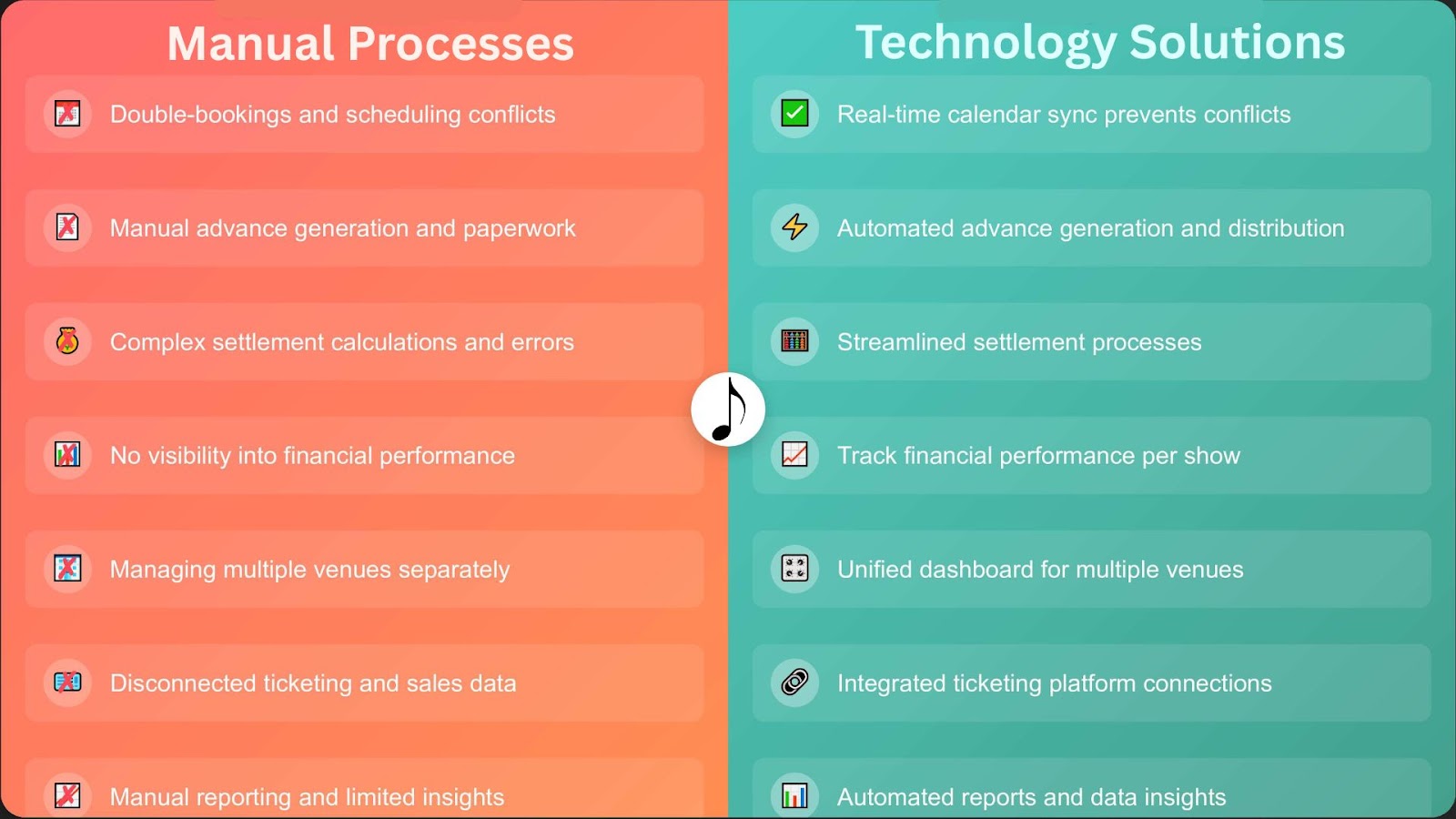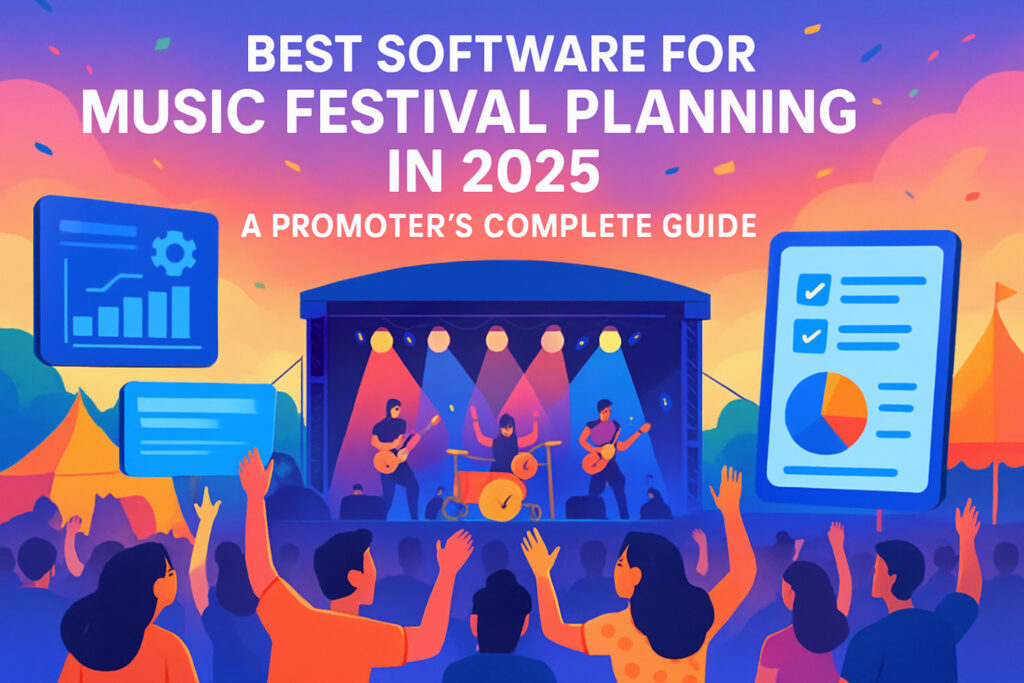
How Venue Operations Software Streamlines Live Events
Modern venue operations software revolutionizes live event management by eliminating manual processes and consolidating workflows. Key benefits include automated scheduling that prevents double-bookings, streamlined logistics coordination with all stakeholders, enhanced communication tools that keep everyone aligned, and integrated financial tracking from offer to settlement. Smart venue managers are choosing specialized platforms over generic solutions to dramatically reduce time spent on administrative tasks.
The phone’s ringing, your inbox is overflowing with contract revisions, and tonight’s headliner just asked to move their sound check up by three hours. Meanwhile, you’re frantically checking three different spreadsheets to confirm the opening act’s rider requirements while trying to remember if you already sent the settlement sheet to last week’s promoter.
Venue managers spend significant portions of their day on administrative tasks like booking coordination and ticketing management. That doesn’t even include the coordination, communication, and countless other moving pieces that make live events happen.
The live music industry grows at unprecedented rates, making venue operations software essential for venues looking to capitalize on this boom. The U.S. concert and event promotion sector is projected to reach $62.7 billion in 2025. However, venues that are still managing operations manually are getting left behind.
Venue operations software changes everything. Unlike generic event management tools, specialized live venue software is built to handle the unique complexity of music industry workflows, from artist negotiations and agent communications to settlement processes and financial reporting.
What Makes Live Venue Software Different from Generic Event Tools?
Software developers designed most event management platforms for corporate meetings, weddings, or conferences. They focus on basic booking calendars and simple payment processing, but live music venues operate in a completely different ecosystem.
When you’re booking a show, you’re coordinating with booking agents, promoters, tour managers, sound engineers, lighting crews, security teams, and sometimes multiple artists per event. You need to track complex financial arrangements, manage co-promoter deals, handle percentage splits, and generate settlements that satisfy everyone from indie artists to major touring acts.
Generic tools treat every event the same way. A wedding reception and a multi-night concert series with different promoters get the same basic template. Live venue software recognizes that venue management is more than blocking dates on a calendar. It’s about managing relationships, complex deal structures, and the intricate web of stakeholders that make live music happen.
The most successful venues are choosing platforms built by music industry professionals who understand the difference between a hard hold and a soft hold, why settlement sheets need to be generated in specific formats, and how to manage the constant flow of changes that define live event production.
How Venue Task Automation Transforms Daily Operations
The global events industry market will reach $2.5 trillion by 2035, driven largely by technological transformation in how events are planned and executed. Venues that thrive in this environment have one thing in common: they’ve eliminated the repetitive, time-consuming tasks that bog down traditional operations. Venue task automation creates space for the strategic thinking and relationship building that actually grow your business.

How Does Automated Scheduling Prevent Double-Bookings?
Real scheduling automation surpasses basic calendar blocking. Advanced venue scheduling platforms sync in real time across all stakeholders, automatically prevent double-bookings, and instantly update availability when changes occur.
When a promoter places a hold on a Tuesday night slot, the system immediately shows that date as tentative to other bookers while sending automated notifications to relevant team members. When the hold converts to a confirmed booking, the system automatically generates contracts with the correct terms and populates settlement templates with the agreed-upon financials.
Modern venues save hours daily by eliminating the back-and-forth emails and phone calls required for basic scheduling coordination. Instead of manually checking availability across multiple rooms and dates, venue managers can see real-time availability and make instant decisions.
How Can Venues Streamline Hold Management and Calendar Coordination?
The old way of managing holds involved sticky notes, separate spreadsheets, and constant manual updates. Modern venue scheduling platforms automatically track hold expiration dates, send reminder notifications before deadlines, and escalate expired holds to the appropriate team members.
Smart hold management also includes automatic routing. When a soft hold expires, the system offers the date to the next qualified promoter in your pipeline.
What Is Intelligent Resource Allocation in Venue Management?
Intelligent automation manages room assignments, equipment allocation, and staff scheduling based on event requirements. When a jazz quartet books your intimate room, the system knows they don’t need the full lighting rig. When a metal band confirms your main stage, it automatically blocks setup and strike time while alerting your production team.
Automation prevents the miscommunications that cause costly mistakes, like double-booking your sound engineer or forgetting to reserve load-in parking for a touring production.
Smart venue managers recognize these operational challenges and are turning to integrated solutions that address the full spectrum of live event complexity.
How Does Venue Operations Software Revolutionize Event Logistics?
Live events involve dozens of moving pieces, tight timelines, and zero tolerance for mistakes. Traditional logistics relied heavily on individual knowledge, scattered communication, and the hope that nothing fell through the cracks. Venue operations software transforms this chaos into organized, trackable workflows.
Why Do Venues Need Centralized Communication Hubs?
Instead of juggling separate email threads with agents, promoters, tour managers, and internal staff, modern platforms create dedicated communication spaces for each event. The system logs every conversation, document revision, and decision in one place, creating a complete historical record that authorized team members can access.
Venues utilizing centralized communication platforms report significant improvements in stakeholder coordination and reduced errors during event execution. Centralization eliminates the common scenario where crucial information disappears into someone’s personal email inbox. When the production manager needs to know about a last-minute rider change, they can access the complete communication history rather than hoping someone forwarded them the right email chain.

How Do Real-Time Updates Improve Stakeholder Coordination?
Live events change constantly. Advanced venue operations software provides real-time updates that automatically sync across all relevant parties. When you move doors from 7 PM to 6:30 PM, the system simultaneously updates everyone who needs to know, including box office staff, security, house manager, sound engineer, and the artist’s tour manager.
These notifications provide actionable intelligence. The bartending staff knows to prep earlier, security knows to adjust their arrival time, and the sound engineer can modify their setup schedule accordingly.
How Does Software Improve Production and Technical Coordination?
Technical riders, stage plots, and production schedules demand precise coordination between venue capabilities and artist requirements. Modern platforms digitize these workflows, creating automated checklists that ensure you miss nothing during the technical review process.
When a band’s production manager uploads their rider, the system flags any requirements that exceed venue capabilities, schedules necessary equipment rentals, and creates production timelines that account for setup and strike windows.
What Communication Features Do Venue Teams Need Most?
Effective venue management requires seamless communication, both internally with your team and externally with the network of professionals you work with on every event. The right platform eliminates communication silos while maintaining appropriate access controls.
How Should Venues Manage Stakeholder Permissions?
Your marketing team needs promotional assets and ticket links, but they don’t need to see financial settlement details. Your sound engineer needs technical specifications and contact information, but not access to contract negotiations.
Advanced permission systems let venue managers grant role-based access, ensuring everyone gets the information they need while maintaining confidentiality around sensitive business details.
Why Is Document Sharing and Version Control Critical?
Contracts, riders, insurance certificates, and promotional materials evolve throughout the booking process. Manual document management leads to confusion about which version is current and who has access to the latest updates.
Modern venue operations software includes robust document management with automatic version control. When the artist’s agent sends an updated contract, the system archives the previous version while making the new document available to authorized users. Everyone always works from the same current information.
How Important Is Mobile Accessibility for Venue Managers?
Venue managers don’t spend all their time at a desk. During events, they’re walking the venue floor, solving problems, and making real-time decisions. Mobile-optimized platforms keep critical information and communication tools accessible, whether you’re in the green room, at the box office, or managing crowd flow in the lobby.
The ability to access schedules, contact information, and communication tools from a mobile device transforms how venue managers operate during events, enabling faster problem-solving and more responsive customer service.
7 Ways Venue Scheduling Platforms Eliminate Common Pain Points
Successful music pros have identified specific operational challenges that venue scheduling platforms solve better than traditional methods:

- Prevent double-bookings with real-time calendar sync: Automated availability management eliminates the classic nightmare scenario of accidentally booking two events on the same night. Real-time synchronization ensures everyone sees the current availability instantly.
- Automate advanced generation and distribution: Technical advances, hospitality riders, and production schedules are generated automatically from confirmed bookings, eliminating manual document creation and ensuring consistent formatting across all events.
- Streamline settlement processes: Financial settlements pull data directly from the original booking agreement, reducing calculation errors and ensuring accurate payouts to artists, agents, and co-promoters.
- Track financial performance per show: Real-time financial tracking provides immediate insights into show profitability, helping venue managers make informed decisions about future bookings and pricing strategies.
- Manage multiple rooms/stages from one dashboard: Multi-room venues can coordinate all spaces from a single interface, optimizing utilization and avoiding conflicts between simultaneous events.
- Integrate with existing ticketing platforms: Direct integration with ticketing systems provides real-time sales data, enabling dynamic pricing decisions and informed marketing strategies.
- Generate reports for better decision-making: Comprehensive reporting tools analyze booking patterns, financial performance, and operational efficiency, providing data-driven insights for strategic planning.
Measuring ROI: How Smart Venues Track Success
The most compelling argument for venue operations software is measurable. Forward-thinking venues track specific metrics that demonstrate clear return on investment.
Time savings represent the most immediate benefit. Eliminating manual scheduling coordination, settlement calculations, and document management tasks creates significant operational efficiencies. This time gets redirected toward revenue-generating activities like artist development, sponsor outreach, and strategic planning.
Error reduction creates a significant financial impact. Manual settlement calculations, scheduling conflicts, and communication breakdowns cost venues both money and reputation. Automated systems virtually eliminate calculation errors while providing audit trails that build trust with agents and artists.
Revenue optimization emerges from better data visibility. When venue managers can see real-time booking patterns, seasonal trends, and financial performance across all events, they make smarter pricing decisions and identify new revenue opportunities.
The venues investing in specialized venue management software consistently outperform those relying on manual processes or generic tools. Live Nation saw a 36% increase in revenue, driven partly by operational efficiency improvements and better technology utilization.
Modern venue operations have evolved to encompass comprehensive business intelligence and stakeholder coordination.
FAQ
What’s the difference between venue operations software and general event management tools? Venue operations software targets live music venues specifically and includes industry-specific features like artist contract management, agent communication tools, complex settlement calculations, and integration with ticketing platforms. General event management tools focus on basic booking and payment processing without understanding the unique workflows of live music.
How long does it take to implement venue management software? Implementation timelines vary based on venue size and complexity, but leading platforms offer white-glove migration services that transfer existing event data while providing intuitive interfaces that require minimal staff training.
Can venue operations software integrate with existing ticketing systems? Yes, leading platforms integrate directly with major ticketing systems, providing real-time sales data and automatic financial updates. Integration eliminates manual data entry while ensuring accurate revenue tracking and settlement calculations.
Transform Your Venue Operations Today
The live music industry’s rapid evolution demands modern solutions. Venues still operating through spreadsheets, email chains, and manual processes are competing at a fundamental disadvantage against operations that have embraced automation and integration.
The venues defining the industry’s future are already leveraging venue operations software to create competitive advantages through operational efficiency, improved stakeholder relationships, and data-driven decision making.
Prism understands the unique complexity of live music. Our purpose-built platform eliminates the inefficiencies that drain time and resources while providing the professional tools that help you book more shows, reduce errors, and focus on creating incredible live music experiences. Get started with Prism today and discover why industry leaders choose platforms built by music professionals.

Matt Ford is the founder and CEO of Prism.fm, an Austin-based software company revolutionizing live music event management. With a background in entrepreneurship and a degree from the University of Wisconsin-Madison School of Business, Ford combined his self-taught coding skills with firsthand experience as a concert promoter to address the inefficiencies he observed in the industry. In 2018, he launched Prism.fm, an all-in-one platform designed to streamline operations for venues, promoters, and agencies by replacing cumbersome spreadsheets with integrated tools for booking, financial tracking, and contract management. Under his leadership, Prism.fm has grown significantly, achieving $3 million in annual recurring revenue post-COVID and securing over $15 million in funding . Ford’s commitment to building user-centric solutions has positioned Prism.fm as a trusted partner for over 1,500 venues and promoters worldwide.


